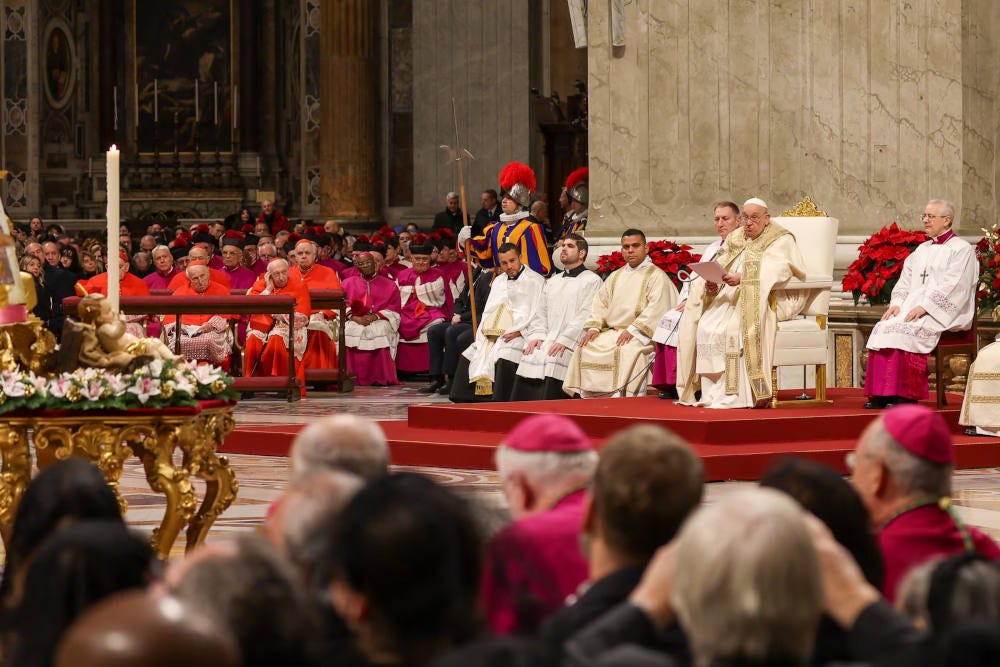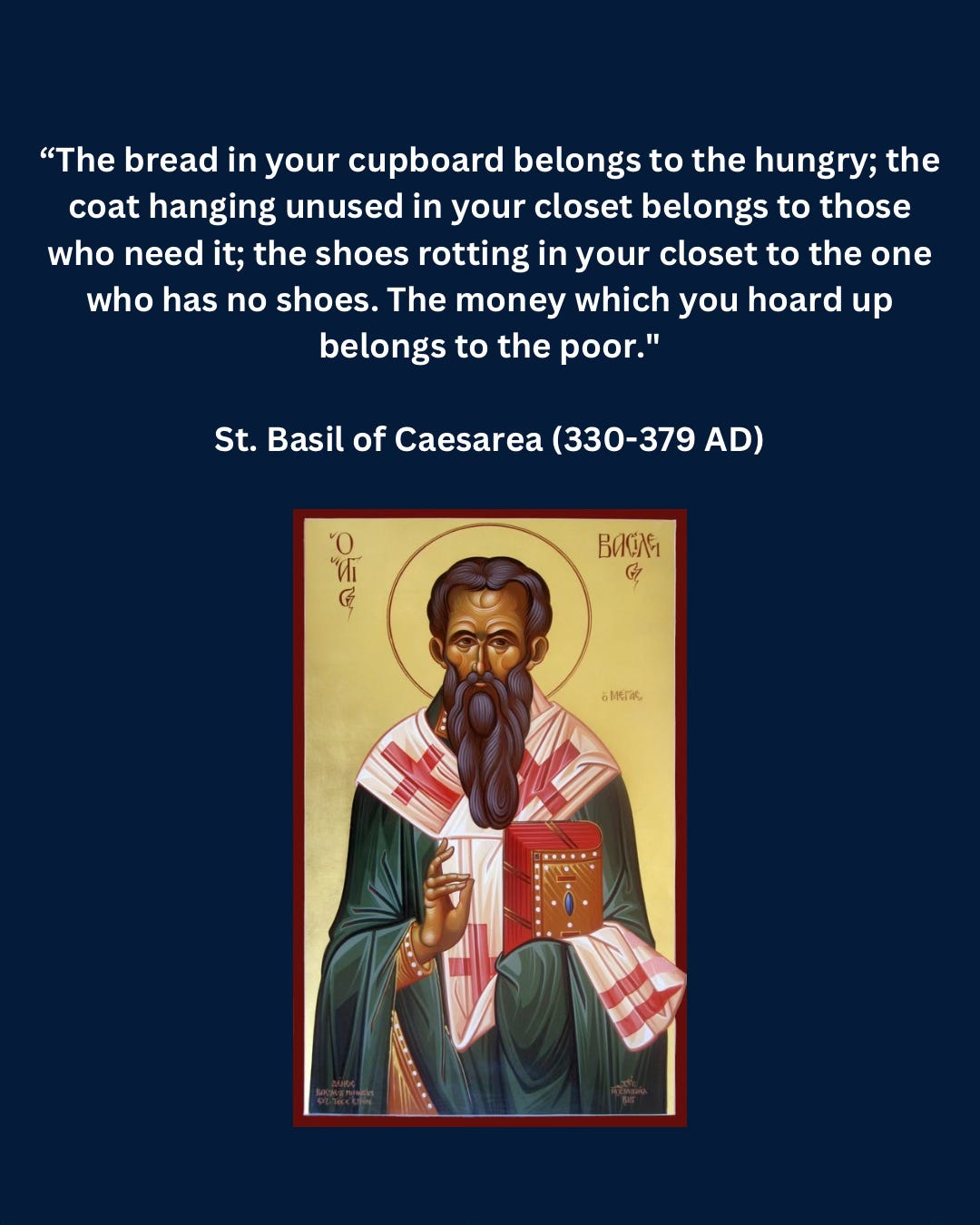I often challenge my readers and listeners to look beyond evangelical theology in reconstructing our faith post-deconstruction: a faith that is more beautiful, justice-oriented, and decolonized. And a faith that looks more like Jesus of Nazareth.
In that vein, I would be foolish to not mention an important tidbit about 2025 that I’ve been learning from my Catholic (and more specifically, Jesuit) friends:
Pope Francis has declared 2025 as a “Year of Jubilee” - a year to dream and work towards a “new world where peace and justice reign”.
Now if you grew up in evangelical world (like myself), and find yourself more familiar with the letters of Paul than the gospel accounts of Christ or the Old Testament prophets (such as Isaiah), you’re likely not as familiar with “the year of Jubilee”.
Contrary to that conditioning, as followers of Jesus, we should all be familiar with the biblical and theological concept of ‘Jubilee’. If for nothing else, then at least for this reason: Jesus mentions ‘Jubilee’ in his very first public sermon - another text often ignored or explained away in evangelical circles. See for yourself from Luke 4:16-21:
When he came to Nazareth, where he had been brought up, he went to the synagogue on the Sabbath day, as was his custom. He stood up to read, 17 and the scroll of the prophet Isaiah was given to him. He unrolled the scroll and found the place where it was written:
18 “The Spirit of the Lord is upon me,
because he has anointed me
to bring good news to the poor.
He has sent me to proclaim release to the captives
and recovery of sight to the blind,
to set free those who are oppressed,
19 to proclaim the year of the Lord’s favor.”20 And he rolled up the scroll, gave it back to the attendant, and sat down. The eyes of all in the synagogue were fixed on him. 21 Then he began to say to them, “Today this scripture has been fulfilled in your hearing.”
What is this “year of the Lord’s favor”? It’s Jubilee!
Quite interestingly, Jesus is reading (and declaring as fulfilled) the words of the Prophet Isaiah in Isaiah 61:1-2.
So what is Jubilee? In Old Testament Israel, Jubilee was meant to be a year of liberation, restoration and wholeness (or ‘Shalom’) that happened after every seventh Sabbath year - basically, every 50 years. Jubilee was intended to be a year of forgiving debts, giving rest to the land, and setting people in slavery free. But instead, as we know all too well in our consumeristic and capitalistic context today, the people of Old Testament Israel disobeyed this command of God’s (which was always intended for our good) - something Jesus ultimately came down to restore through his body (both his physical body and his embodied presence, the Church).
The Catholic Church has a longstanding tradition of celebrating every 25th or 50th year as the year of Jubilee. Their last year of Jubilee was 2000 - declared accordingly by another great Pope, Pope John Paul II.
In Pope Francis’ Jubilee address on Christmas Eve 2024, he said, "The Jubilee calls us to spiritual renewal and commits us to the transformation of our world, so that this year may truly become a time of jubilation. The Pope went on to call for, “A jubilee for our Mother Earth, disfigured by profiteering; a time of jubilee for the poorer countries burdened beneath unfair debts; a time of jubilee for all those who are in bondage to forms of slavery old and new."
In calling the faithful followers of Jesus to be “pilgrims of hope” (also, the Catholic Church’s theme for this Year of Jubilee), Pope Francis called Christians everywhere “to bring hope to the interminable, dreary days of prisoners, to the cold and dismal lodgings of the poor, and to all those places desecrated by war and violence…Hope is incompatible with the detachment of those who refuse to speak out against evil and the injustices perpetrated at the expense of the poor."
Becoming pilgrims of hope for the sake of our marginalized neighbours however, requires something from us - humility.
My Jesuit friend, Brother Dan Leckman, SJ articulated this most profoundly on his Facebook:
“There’s a pattern that I've noticed in the lives of many Christians and Catholics alike: It's almost as if their faith is rooted in an intense joy around being saved, and seeing that others are not saved…Almost as if they're saying 'If I put this much effort into believing the way I do, I need to know I'll have a reward that others won’t'. It's a very worldly way of thinking. We want to be rewarded by the work we do; if others get rewards for not doing the same, we’re outraged.”
Brother Dan hits the nail on the head of a theology shaped by the American Empire’s ideals of rugged individualism and capitalistic greed. His words remind me of the time right wing American political radio host (and all round shill for Empire), Erick Erickson attacked me for tweeting this around two and a half years ago:
In an Instagram video, Erick disagreed with me by making a snide comment about not holding my Canadian-ness against me, quoting one Bible verse completely out of context and then going on to say, “We can actually keep theology out of this” before launching into why he theologically and politically disagreed with me. After basing his entire argument on that one Bible verse, he then proceeded to call my theology “shallow” because it didn’t line up with his American Empire-shaped theology. In keeping with the greedy, profiteering ideals of American Empire, Erick even put his thoughts in response to me behind a paywall on his Substack (without even offering to share the royalties - rude!).
But here’s why I bring all this up - what we think about issues like debt forgiveness also indicates what we think about divine grace. And “liberation for me but not for thee” is an ideal of Empire that stands in stark contrast with the Way of Jesus of Nazareth.
Here’s my prayer for us as a community in 2025 - this year of Jubilee:
May we resist the ways of Empire (especially the American Empire) and embrace the just, liberating, and restorative ways of Jesus of Nazareth - especially for the sake of our marginalized neighbours.
A Reflection on the Saints
Today is the Feast of St. Basil of Caesarea (also known as St. Basil the Great), a 4th Century Eastern Church Father. I quote St. Basil’s teachings on justice a good bit in my book which releases this Fall. If St. Basil were alive today, he would no doubt be labeled a ‘Marxist’ by western church leaders who are discipled & formed by the American Empire; but his teachings profoundly mirror the teachings of Jesus.







A few years ago, a study was done amongst evangelicals about how they felt about undocumented immigrants receiving citizenship (please don't make me find it! I think World Relief was involved) The majority felt that having a path to citizenship was fine, as long as they paid some sort of fine or penalty--nevermind that the vast majority of potential recipients have been paying taxes and getting no benefits or representation from that for years. It struck me as terribly ironic, that those who have received so much for free, and have been commanded to give as they have freely received (Mt 10:8), demanded some sort of payment be made before this "debt" (of being undocumented) could be forgiven!
Great idea - I am always struck by this concept that our society seems to be locked in with - if we paid for something everyone should pay - no matter the cost so to speak. Why is debt forgiveness so hard, or for that matter helping others whether its housing, food or health care or education. We need to get past this mindset - well I had to pay so should everyone else, we have to start somewhere. Maybe a year of Jubilee is the place......